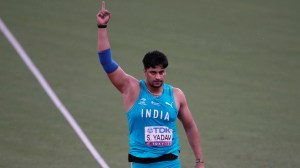Scorched by terror, they ask why their children had to die
They died the day the Valley was remembering the martyrs of 1931. Only, Saturday’s 27 victims were reluctant martyrs, impoverished rag ...

They died the day the Valley was remembering the martyrs of 1931. Only, Saturday’s 27 victims were reluctant martyrs, impoverished rag pickers and their families who have very little to do with the world of politics and militancy.
‘‘How had they harmed the militants in any way? Why did they kill my grand-daughters?’’ asked Rajiv Nagar resident Lacho Devi as she waited outside the mortuary for the bodies of her teenage grand-daughters.
It was a question many shattered parents echoed at the Jogi Gate Cremation Ground. As he sat near the body of his four year-old son Mahesh, Pappu said, ‘‘Just yesterday, my son was asking me to get him a new textbook to replace his torn one.’’ His wife Kalo and daughters Pathani (8) and Poonam (10) were injured in the firing.
Pappu came to Narwal only two years ago from his native Choru village in Rajasthan. ‘‘I never thought that the place where I earned my bread and butter would become my son’s graveyard some day.’’
Mohini also lost her two daughters Sunita (18) and Chandni (19) on Saturday, along with three of her nieces. ‘‘We were planning to marry off the five girls by Diwali,’’ she said.
The family members of the deceased heaped some blame at the Power Development Department’s door. ‘‘Had they repaired the transformer, we would have spotted many of the injured in time and saved their lives,’’ says Rajiv Nagar resident Nanku.
His daughter, Sunita, who was hit by a bullet in the leg, took shelter behind a log of wood, and lay there bleeding for half an hour. Her family members were able to spot her only when a police vehicle passed by.
‘‘It was too late by then. She died due to excessive bleeding,’’ wept her aunt.
The massacre has now spurred the flight of some families from the 500 slums in Rajiv Nagar to neighbouring areas like Qasim Nagar. The only visible signs of life—and death—at Rajiv Nagar today were kitchen utensils strewn all over and blood stains.
Several organisations have called for a bandh on Monday. The government also announced that an ex-gratia relief of Rs one lakh will be given to the next of kin of the victims. While Rs 75,000 will be given to those who have been disabled, Rs 5,000 to those who sustained minor injuries.
The injured are recovering from their wounds at the disaster ward of Jammu’s Government Medical College Hospital. Parveena, who reached Jammu along with her children on Saturday to spend the holidays with her brother’s family, found herself on a hospital bed instead, writhing with pain.
Several hours after the incident, she was still unaware that her brother, Vijay Kumar, was among the 27 casualties. ‘‘She’s been asking about Vijay since morning. Each time, I try and divert her attention,’’ said Sanjay, one of Vijay’s neighbours.
On Saturday evening, says Sanjay, Vijay ran out of his house when he heard the sound of bullets, only to get shot himself.
‘‘Had his mother Shrishta Devi not thrown herself atop her children, they too would have died,’’ adds Sanjay.
While Manoj landed up in hospital because of his love for cricket. ‘‘Normally, I’m in my house at this time (the evening). But yesterday, I was sitting on the roof-top of my friend’s house, listening to cricket commentary on the radio when a grenade was hurled at us,’’ says Manoj, who has splinter injuries all over his leg.
(With inputs from Bharat Bhushan)
Photos



- 01
- 02
- 03
- 04
- 05




























